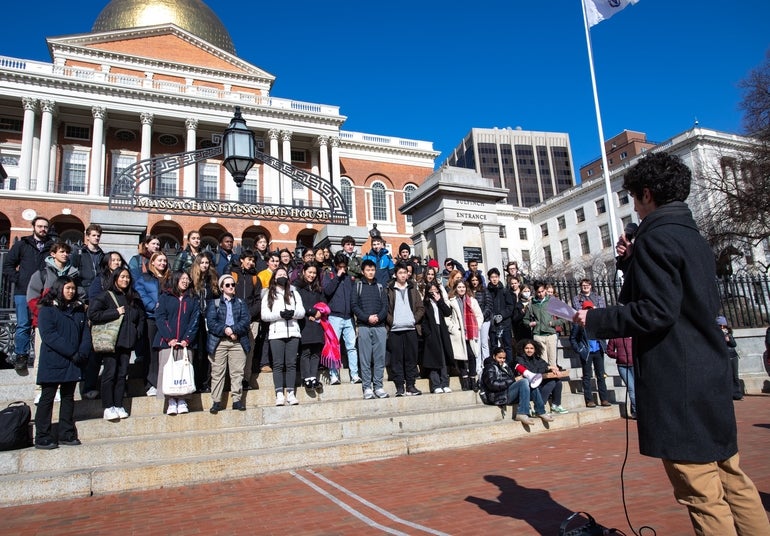Around 50 schoolkids descended on the State House Tuesday to lobby for their climate agenda, but before they started knocking on lawmakers’ doors, one 16-year-old student told the crowd that their activism was hampered by the secret nature of the Legislature’s committee votes.
Organized under the umbrella of the Massachusetts Youth Climate Coalition (MYCC) with support from youth-led group Our Climate, the students’ policy pitch featured five proposals — four of them climate-related bills, the fifth a proposal for added transparency from their elected officials.
One crucial step in a bill’s journey through the Legislature is a committee vote on whether or not to recommend passage. Most committees do not publicly share a breakdown of how every member votes at that stage, and the House and Senate do not take recorded votes even on most of the bills that make their calendars.
“We are here to pass climate legislation, it’s true. But it’s hard to do that when you don’t know the opinions of the people you’re petitioning for change,” said Sebastian Lemberger, a student at Phillips Academy Andover. “If we really want to make progress on issues like climate change, issues that we care about, we cannot be kept in the dark.”
Pointing up at the Golden Dome from the Beacon Street sidewalk, the 16-year-old said that “the people in power, the people up there in that State House remind me why I have grown to be so cynical.”
Recorded votes that show where each legislators stands on particular policies create a trail that political challengers can use to compare and contrast themselves during election season. In the House and Senate, most of the recorded votes taken occur in connection with non-controversial bills where such votes are required or when there is unanimous or near-unanimous support for a particular proposal. In cases where there is dissent on recorded votes, it often breaks down along party lines.
The House and Senate are in the midst of debate on joint rules, with the House opposing an effort to shed more light on how committee members vote on bills and Senate leaders favoring more disclosure.
Winsor School sophomore Anaya Raikar, of Brookline, said she was excited by the prospect of meeting with Rep. Tommy Vitolo and Sen. Cynthia Stone Creem in her first year of “really getting involved” with climate advocacy.
She followed a couple of her friends into the group Our Climate, in part because she was impressed by how they spoke directly with lawmakers. One of her favorite bills in MYCC’s platform Tuesday was an “interdisciplinary climate justice” curriculum proposal (HD 339 / SD 498).
“I’ve seen a lot of talk of climate science in school, like the scientific reason as to why it’s happening, but we don’t talk about the current effect it has on people. And I think that’s a really kind of ignored part that needs to be brought into school curriculums. Like the humanitarian aspect,” said Raikar.
That climate education bill, filed by Sen. Julian Cyr and former schoolteacher Rep. James Hawkins, was “completely written by youth,” Our Climate organizer Eben Bein said, with some drafting feedback provided by teachers and others.
MYCC affiliates were also lobbying Tuesday for a “polluter pay climate superfund” bill (HD 3460 / SD 2366), a renewable energy renovation fund bill (HD 776 / SD 500), and air quality legislation (HD 2474 / SD 1180).
There were some activist adults on hand to support the students, including a volunteer from Act On Mass and retired Malden schoolteacher Ruth Comstock from the Mass. Teachers Association, who offered support for the climate ed bill.
“If the point of education is to prepare you for life, our schools are not preparing most of the students for life. And climate change is part of that. Most of these students will experience [climate change] … So I would say this is one of several issues that students should be learning about in school,” she told the News Service as the students made their way indoors.

